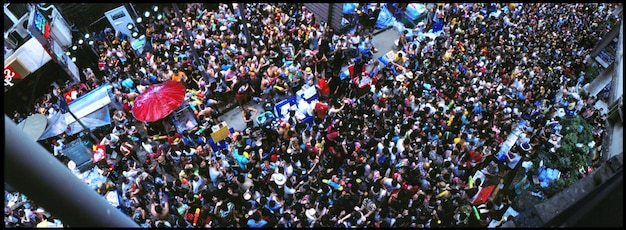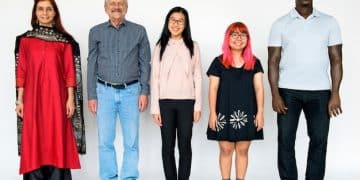Long-Term Effects of the 2024 Election on US Social Divisions

The 2024 election cycle in the US is poised to have lasting repercussions on social divisions, potentially exacerbating existing tensions related to political polarization, cultural identity, economic inequality, and racial justice for years to come.
The 2024 election cycle has concluded, but its echoes will reverberate through American society for years. Understanding the long-term effects of the 2024 election cycle on US social divisions is crucial to navigating the challenges and opportunities ahead.
Understanding the Deepening Political Polarization
Political polarization has been on the rise in the US for decades, and the 2024 election cycle only amplified this trend. The rhetoric, the issues debated, and the outcomes themselves have the potential to further entrench divides.
The Widening Ideological Gap
One of the most apparent effects is the widening ideological gap between the left and right. With each election cycle, the parties move further apart on key issues, making compromise and consensus increasingly difficult.
The Role of Media in Polarization
The media landscape plays a significant role in this polarization. With the rise of partisan news outlets and social media echo chambers, individuals are primarily exposed to information that confirms their existing beliefs, reinforcing their biases and creating deeper divides.

- The proliferation of echo chambers online.
- The decline of trust in mainstream media.
- The rise of partisan news outlets catering to specific ideologies.
Ultimately, the deepening political polarization fueled by the 2024 election cycle poses significant challenges to American democracy. It creates gridlock in government, makes it harder to address pressing social and economic issues, and can even lead to increased social unrest and violence.
Impact on Cultural and Identity Divisions
Beyond the strictly political realm, the 2024 election cycle has also had a profound impact on cultural and identity divisions within the US. Issues related to race, gender, religion, and immigration have become increasingly politicized.
The Resurgence of Culture Wars
The election cycle often becomes a battleground for culture wars, with candidates and parties using divisive rhetoric to mobilize their bases. The long-term effects of the 2024 election cycle on US social divisions become very apparent here.
Erosion of Common Ground
As cultural and identity issues become more politicized, it becomes harder to find common ground and build bridges across different groups. This can lead to increased animosity and distrust, further fragmenting American society.
Addressing these cultural and identity divisions will require a concerted effort to promote understanding, empathy, and respect for diversity. It will also require a willingness to engage in difficult conversations and challenge our own biases.
Economic Inequality and Social Discontent
Economic inequality has long been a source of social discontent in the US, and the 2024 election cycle brought this issue to the forefront. The debates over tax policy, healthcare, and social safety nets highlighted the deep divisions.
The Widening Wealth Gap
The wealth gap between the richest Americans and the rest of the population continues to widen. The election cycle often becomes a referendum on how to address this inequality, with different parties offering competing solutions.
The Impact on Social Mobility
Economic inequality has a direct impact on social mobility, making it harder for individuals and families to improve their economic standing. This can lead to frustration, resentment, and a sense of hopelessness, further fueling social divisions.

Addressing economic inequality will require a comprehensive set of policy solutions, including investments in education and job training, raising the minimum wage, strengthening unions, and reforming the tax code. It will also require a shift in mindset, away from a focus on individual wealth accumulation and towards a more equitable distribution of resources.
Racial and Ethnic Tensions
Racial and ethnic tensions continue to be a major source of social division in the US. The 2024 election cycle was no exception, with issues of immigration, policing, and racial justice playing prominent roles.
The Legacy of Systemic Racism
The election cycle often becomes a platform for discussing the legacy of systemic racism in the US and how to address its ongoing effects.
The Impact of Immigration Policy
Immigration policy is another major source of racial and ethnic tensions. Debates over border security, deportation, and pathways to citizenship often become highly charged, with different parties offering competing visions for the future of immigration in the US.
- Addressing historical injustices.
- Promoting diversity and inclusion in all sectors of society.
- Reforming the criminal justice system to address racial bias.
Ultimately, addressing racial and ethnic tensions will require a commitment to building a more just and equitable society for all Americans. It will require a willingness to confront the legacy of racism and discrimination and to work towards a future where everyone has the opportunity to thrive.
The Role of Social Media and Misinformation
Social media has become an increasingly important source of news and information, but it has also become a breeding ground for misinformation and disinformation. The 2024 election cycle saw a surge in the spread of false and misleading narratives.
The Echo Chamber Effect
Social media algorithms tend to create echo chambers, where individuals are primarily exposed to information that confirms their existing beliefs. This can reinforce biases and make it harder to engage in constructive dialogue with those who hold different views.
The Challenge of Fact-Checking
The rapid spread of misinformation on social media makes it difficult to fact-check and debunk false narratives in real time. This can have a significant impact on public opinion and even influence election outcomes.
Combating the spread of misinformation and disinformation will require a multi-faceted approach, including media literacy education, fact-checking initiatives, and greater regulation of social media platforms.
Healing the Divide: Paths Forward
Given the depth and complexity of the social divisions exacerbated by the 2024 election cycle, healing the divide will not be easy, but it is possible through concerted effort.
Promoting Civil Dialogue
One of the most important steps is to promote civil dialogue and encourage people to listen to and understand those with different viewpoints. This requires creating spaces where people can engage in respectful conversations without fear of being attacked or ridiculed.
Investing in Education
Investing in education is also crucial. By teaching critical thinking skills and promoting media literacy, we can empower individuals to evaluate information more effectively and resist the lure of misinformation and disinformation.
- Building coalitions across ideological divides.
- Focusing on shared values and common goals.
- Promoting empathy and understanding.
Ultimately, healing the divide will require a collective commitment to building a more inclusive, equitable, and just society. It will require a willingness to challenge our own biases and work towards a future where everyone feels valued and respected.
| Key Point | Brief Description |
|---|---|
| 🗳️ Political Polarization | Deepening ideological divides and partisan media influence. |
| 🎭 Cultural Divisions | Resurgence of culture wars and erosion of common ground. |
| 💰 Economic Inequality | Widening wealth gap and limited social mobility. |
| 📰 Misinformation | The spread of false narratives through social media. |
Frequently Asked Questions
▼
Political polarization can affect everyday life by influencing social interactions, where people may avoid discussing politics with those of differing views to prevent conflict. It can also lead to biased news consumption and increased distrust in government institutions.
▼
The main drivers of cultural division include debates over identity politics, historical interpretations, and values relating to family, religion, and national identity. These can often intersect with political ideologies, creating further polarization.
▼
Economic inequality can foster resentment and distrust among different socioeconomic groups. Those struggling financially may feel marginalized, while wealthier individuals may not fully understand or appreciate the challenges faced by others, leading to social stratification.
▼
Combating misinformation requires a multifaceted approach that includes media literacy education, improved fact-checking initiatives, and increased oversight of social media platforms. Individuals can also play a role by verifying information before sharing it.
▼
Community initiatives such as interfaith dialogues, neighborhood associations, and volunteer programs can foster understanding and build relationships across different social groups. These initiatives provide opportunities for people to interact, share experiences, and work together towards common goals.
Conclusion
The long-term effects of the 2024 election cycle on US social divisions are complex and far-reaching, touching on dimensions of political polarization, cultural identity, economic inequality, and racial justice. Ultimately, bridging these divides requires a commitment to civil dialogue, education, and community engagement built on mutual respect and understanding.





